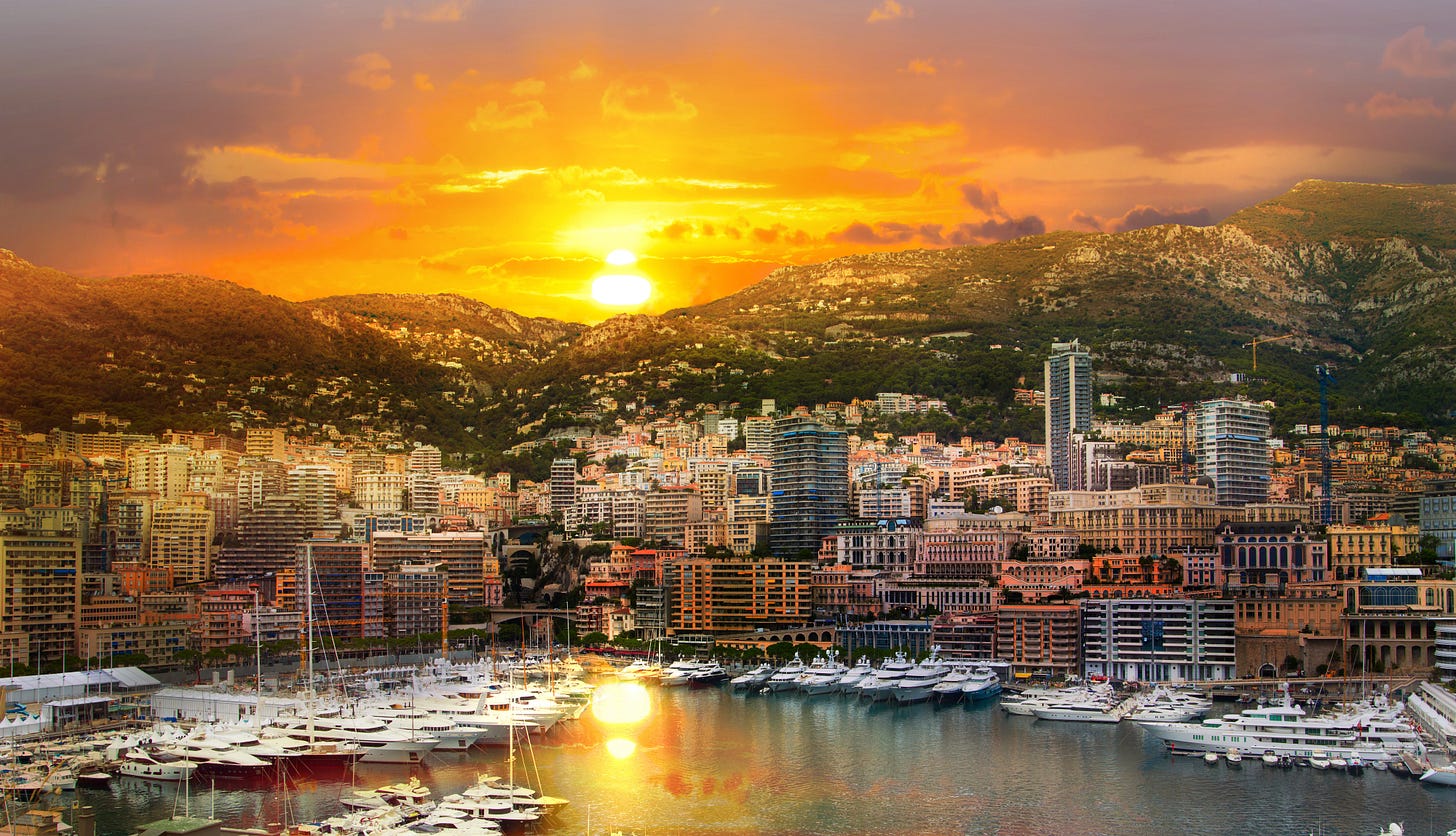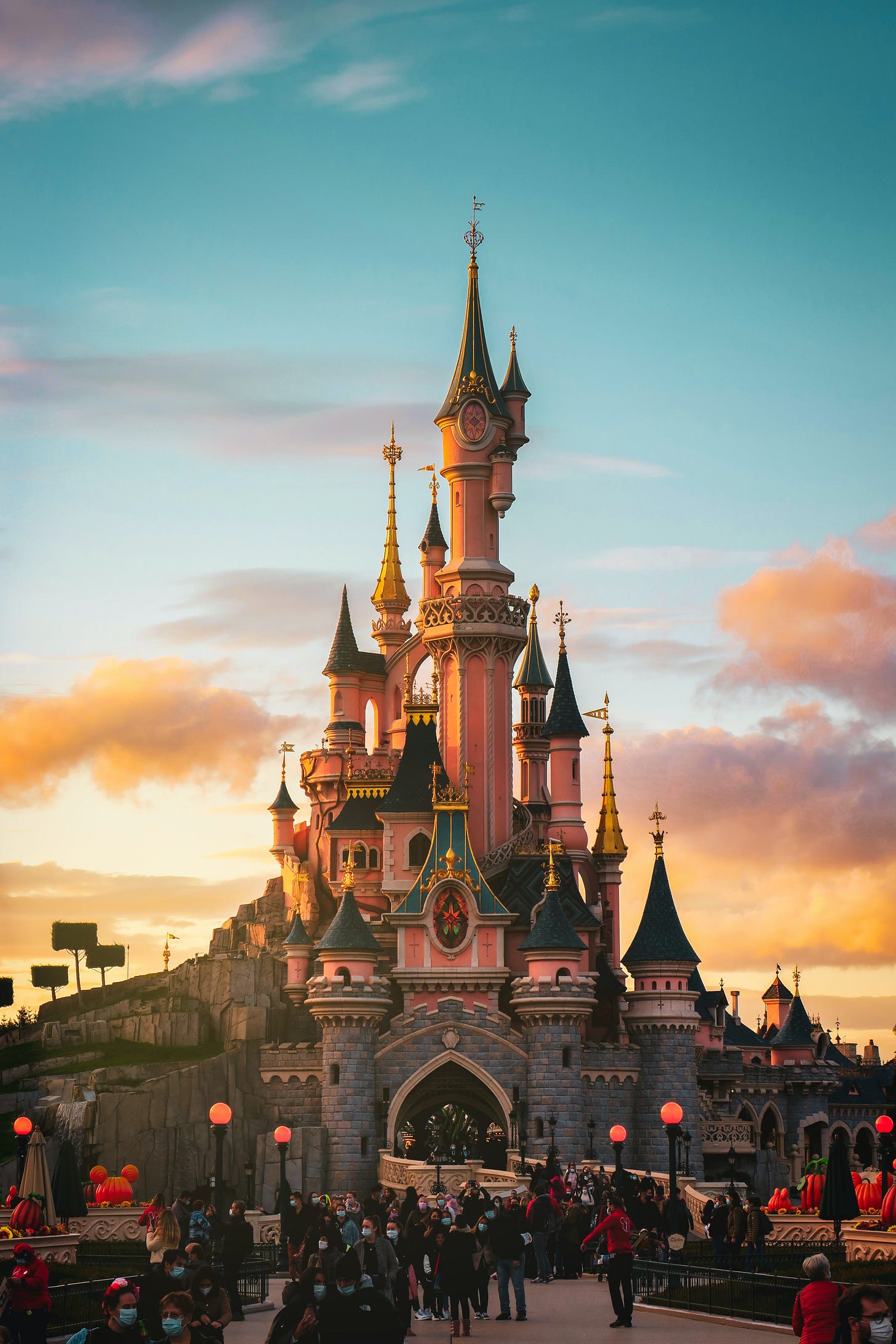Making an event of it
With commercial models in flux, could new live experiences and theme park-style attractions help sport find different ways of appealing to fans?
Being there
The Monaco Grand Prix is shorthand for the classic image of Formula 1.
It’s synonymous with the championship’s most alluring cliches: rich in history, prestige, a certain type of high-sheen Riviera glamour and some very, very conspicuous consumption.
The race is two decades older than F1 itself and buzzes with notes of motorsport’s past, reaching back beyond Hamilton and Senna to Fangio, and Graham Hill, and Steve McQueen in a natty watch. And maybe, whisper it, it’s got a little dated – a low-speed street circuit with limited overtaking opportunities that might not be the optimum showcase for all that premium engineering.
Last Sunday’s edition, won comfortably by world champion Red Bull driver Max Verstappen, was a model example until the weather intervened late on.
“It was an exceptionally boring race until the rain came down,” was [fifth-placed George] Russell’s damning verdict.
The obvious counter is that this is not the central point of F1 in Monte Carlo. For plenty who attend, Monaco is a happening, a place to be and to be seen – just the once or every season, depending on your bank balance and the company you keep.
This is something Formula 1 has leaned into in the Liberty Media age. The general admission punter gets concerts and other race weekend entertainment; the ultra high-end hospitality client gets F1 Experiences. Grid walks, chats with legendary drivers and garage tours are all available for the right price and newer venues – like the Liberty-organised Las Vegas Grand Prix that debuts in November – have been configured with all that in mind.
And this is not stopping with the live race. F1’s media offering runs from hyper-technical OTT feeds for petrolheads to the Drive to Survive soap opera and now a Grand Prix broadcast for kids. It was inevitable that its in-person experience ecosystem – and that of other sports – would begin a similar expansion.
Social, not media
Based at One New Change between St Paul’s Cathedral and the City of London financial district, F1 Arcade presents a very different but still official take on race day.
The £6 million venue opened earlier this year and houses 60 simulators, a bar and kitchen. With an entry price of £13.75, it’s a little more accessible than the Paddock Club and the fun of it is less contingent on anyone getting close to Max Verstappen.
F1 Arcade marks the latest phase of a ‘competitive socialising’ boom that has swept across major cities. It was developed under the guidance of Kindred Concepts founder Adam Breeden, a hospitality entrepreneur whose own Puttshack for mini-golf, Flight Club for darts and Bounce for table tennis are central examples of the trend, alongside other chains like cricket bar Sixers and, for football, Toca Social.
The joint venture is one that Breeden believes can outpace the performance of his earlier companies, which “like to be in profit in month one”.
“Never before have I had a weight of a global brand behind what I’ve done,” [he said, speaking to the Independent in February]. “It’s the name above your door, the brand recognition, the support from F1 from a marketing perspective – and you’ve got half a billion fans around the world.
“That’s pretty powerful. It has that edge which the others don’t.”
That bullishness is further expressed in the decision to open other F1 Arcade venues in Birmingham and across the Atlantic in Boston. According to Andy Marston’s Sports Pundit newsletter, ‘F1 Arcade expects to have 12 million fans passing through its doors within five years’, with 350,000 heading to One New Change in 2023, and it ‘plans to open 36 venues over the next half decade’.
This was a concept that was bound to tweak sport’s commercial antennae sooner or later. They could, in small ways at first, rewire bits of the culture as well.
Toca Social, which sold an equity stake to Major League Soccer last October, welcomed Leah Williamson as a partner and ambassador in May. The Uefa Euro 2022-winning Arsenal and England captain spoke not just of the chance to build the business of the female game but of giving young women a chance to play “without owning a pair of football boots”.
“We are changing the perception, but especially for a young girl to walk into a team and own that she wants to play football – it wasn’t the easiest for me for at my age, and it still won’t be easy for some girls in certain places where there isn’t a girls’ team.”
Meanwhile, Callaway-owned TopGolf made $404 million in revenue in the first quarter of 2023, a year-on-year increase of over 25%. For all that its indoor facilities offer a much more stripped-back version of the sport, they can be a less intimidating, less resource-intensive place for casual players to encounter it.
And there is more than a passing resemblance between TopGolf and TGL, the tech-heavy indoor league teeing off next year from the PGA Tour and TMRW Sports – an investment vehicle fronted by Rory McIlroy and Tiger Woods.
Coin-operated
A lot of this will feel familiar to veterans of the arcade boom of the 1980s and 90s: mallrats, Street Fighter II completists, anyone ever served birthday cake at their local Mega Bowl.
The Ozymandian zenith of that period was London’s Trocadero, which approached the end of the last century as the home not just of the Sega Zone, with its rocket escalator, but also an IMAX cinema, indoor rides like the Pepsi Max Drop, a ‘secret McDonald’s’ and multiple sources of sugary snacks.
By the mid-2000s, it was a haunted shell. Today, the building that housed it is a business hotel promising calm amid the frenzy of the city’s tourist core.
Digital disruption came for video games first. Coin-op ports to home machines moved from serviceable to ‘arcade perfect’ to obviously superior; the notional competition grew from the questionable role model in the Guns ‘n’ Roses T-shirt to everyone in the world, all the time. The adolescent social lives that once revolved around these spaces became easier to organise online, too.
The wider industry has thrived in that transition. Single unit sales and in-play purchases have kept the PC, console and mobile markets growing. Shared experiences in the arcades partly shifted into esports. For the most part, gaming’s business model works in the digital age.
Other forms of media – not so much. Like gamers, TV viewers have much better options at home than they did in the 90s: more choice on bigger, flatter screens with fancy soundbars. But bundling movies and shows into massive subscription streaming services is proving costly and providing single points of failure.
The major studios spent the pandemic era flirting with the end of the cinema but, faced with the cratering value of their new content, they have started to think again. In fact, that revival is now being underwritten by tech giants like Apple, which is spending a reported $1 billion getting its new films on the big screen.
Amazon, which bought James Bond’s MGM Studios in 2022, is also planning wide cinematic releases over the next year. In both cases, these ambitions are more extensive than those of Netflix, which has previously put its films into short theatrical runs to make them eligible for Oscars.
Apple’s gambit could well be laced with a similar vanity and the same need to drive consumers to its streaming platform. Yet the world’s sometime biggest company is not exactly without pragmatism. Its glossy retail stores are not just a brand touchpoint – they make a lot of money.
This is not a halo effect – it’s a flywheel. Some people still love the cinema and if you sell enough cinema tickets for a movie, you make a profit for that movie; if it’s good, others will pay again to watch it somewhere else.
Much of sport has a version of the same quandary but even with the live media rights market in flux, the live event concept is pretty resilient – both in the venue and other settings like fan parks. Still, if there are possibilities to be found in between them, this is probably the moment where people will go looking for them.
Variations on a theme
Much of this will hinge on finding a viable scale.
Disney’s parks and cruises have been a vital link in its 21st century strategy of IP acquisition – with families meeting an ever-expanding cast of favourites there – and their post-pandemic rebound has been invaluable amid the financial challenges of growing Disney+. Other entertainment groups have built their own momentum: Universal Studios has capitalised on the box-office smash of the year by introducing a Super Mario World attraction in Florida.
But there is an extremely high cost to entry here. Projects like this take years to bring to life and – as Disney found when it decided to close its much-hyped Star Wars: Galactic Starcruiser experience – can involve some trial and error on pricing.
Sport has a bit of a chequered recent history when it comes to theme parks. The NBA Experience launched at Disney World in August 2019 but did not reopen with the rest of the park after lockdown – even though the league had played its ‘bubble’ postseason there in the summer of 2020.
Real Madrid expect to open a theme park experience in Dubai by the end of this year. But then, infamously, they’ve been down this road before.
The reality, in most cases, will be smaller, nimbler, less monolithic. Beyond traditional staples like coaching clinics, trends in Secret Cinema-style immersive theatre might hint at what will be tried with branded events.
Stranger Things, perhaps the ultimate streaming-first success of the last decade, has already parlayed its recreation of the 80s family horror aesthetic into merchandising sales. Now, it has rolled out a live show, which is making the journey from LA to London’s West End this summer.
Across the city, on the fringes of London’s Olympic Park, Abba Voyage has entertained over a million fans. The hologram concert is a natural extension of the modern appetite for seeing older bands live: in this case, an older band who have refused to perform together in 40 years but retain a keen sense of the value of their back catalogue.
There have already been attempts to explore sport’s past in this way. Collaborating with Wimbledon in 2019, Rematch staged an atmospheric recreation of Bjorn Borg’s 1980 final against John McEnroe. It is currently working on a production based on the Rumble in the Jungle. Technologies like those powering Abba Voyage could unlock a new set of possibilities.
Perhaps, as the Monaco Grand Prix adapts to the demands of Formula 1 in the 2020s, fans elsewhere can step into its world as it used to be.
Eoin Connolly is a sports industry writer, editor and presenter. He is also the editorial director at Trippant.





